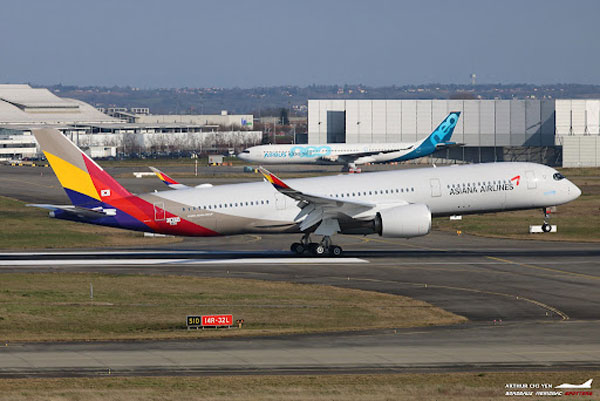Korean Air-Asiana merger faces hurdles amid debt concerns, regulatory scrutiny, and union opposition

[A photo of Asiana Airlines’ Aircraft. Photo Credit to Flickr]
Korean Air is trying to acquire and merge Asiana Airlines, the country's second-largest carrier, with the support of its creditor, the Korea Development Bank (KDB).
Asiana Airlines lost ground after HDC Hyundai Development gave up while negotiating for the acquisition in September 2020.
With a debt ratio exceeding 2000% as of the first half of 2020, Asiana airlines faced a substantial financial burden.
Subsequently, the KDB announced its intention to pursue the merger of the two airlines and provide funding.
The KDB plans to inject 800 billion won into Hanjin Kal, Korean Air’s parent company, to facilitate Hanjian Kal’s takeover of Asiana Airlines.
The KDB’s involvement is due to its role as a creditor that has lent Asiana Airlines 3.3 trillion won to date, effectively making it an ultra-large investor.
If Asiana Airlines becomes unrecoverable, the KDB will be unable to recoup its loan.
However, the KDB’s funds are derived from public taxes.
Consequently, the tax money can only be recovered if Asiana Airlines remains operational and its stake is eventually sold.
On January 14, 2021, Korean Air submitted a business combination report to more than 10 competition authorities around the world.
As of now, Korean Air has received final approval from all required reporting countries except the United States, which has postponed its decision, and conditional approvals from the European Union and South Korea.
The reporting countries include the U.S., EU, Japan, South Korea, China, Turkey, Taiwan, Vietnam, and Thailand.
The merger of Korea’s first and second-largest airlines raises concerns about monopolies.
However, if the second-largest airline fails, the top airline will naturally monopolize the market anyway, potentially allowing the Fair Trade Commission to grant exceptional approval for the acquisition.
Currently, Hanjin Group Chairman Cho Won-tae, who holds a similar stake in Korean Air, and private equity fund KCGI are competing for management rights.
In 2020, Chairman Cho Won-tae announced plans to hold a board meeting in 2020 to approve the integration of Korean Air and Asiana Airlines.
Analysts suggest that Chairman Cho Won-tae's decision to proceed with the takeover, despite potential difficulties for both companies, is based on the calculation that he can secure a strong ally in the Korea Development Bank and gain an upper hand in Hanjin KAL's management dispute.
KCGI defined the decision as a preferential treatment for Chairman Cho and vowed to prevent it using all legal means.
Kang Sung-bu, CEO of KCGI Fund, stated, "This is a matter that seriously undermines shareholder rights and shakes the foundation of the commercial law."
On July 9, 2024, the Asiana Airlines pilots' union (APU) sent a letter to the European Commission and the Star Alliance Airline Pilots Association (ASAP) opposing the merger with Korean Air and the sale of its cargo division.
In addition, 70 out of 200 pilots of the cargo plane submitted their resignations to the union, and on the 11th, the union announced plans to hold a joint press conference with the Asiana Airlines labor union to voice their opposition to the merger.
Furthermore, the union has warned that it will charge Asiana Airlines CEO Won Yoo-seok with breach of trust over the transfer of two A350 aircraft, originally scheduled for introduction this year, to Korean Air.
On top of that, on July 19, 2024, a national petition was launched against the merger and acquisition of Korean Air and Asiana Airlines.
If Hanjin Group gives up the acquisition or fails to secure approval from any of the mandatory screening and voluntary reporting countries, the merger will be canceled.
The future is still uncertain as the U.S. has not yet approved the merger as of 2024.
The Joe Biden administration views the market monopolies negatively and is wary of monopolies resulting from M&As, as evidenced by its disallowance of the merger between JetBlue and Spirit Airlines.
Moreover, since the United States operates under a case law system, approval is highly unlikely.
Following JetBlue and Spirit Airlines’ decision to abandon their merger on March 4, and given that U.S. authorities did not permit that merger, it is unlikely to be overturned in court.
If the acquisition is delayed until 2025, the U.S. position or attitude may change with the end of the Biden administration.

- Stella Sun / Grade 8 Session 5
- Ridgecrest Intermediate School

![THE HERALD STUDENT REPORTERS [US]](/assets/images/logo_student_us.png)
![THE HERALD STUDENT REPORTERS [Canada]](/assets/images/logo_student_ca.png)
